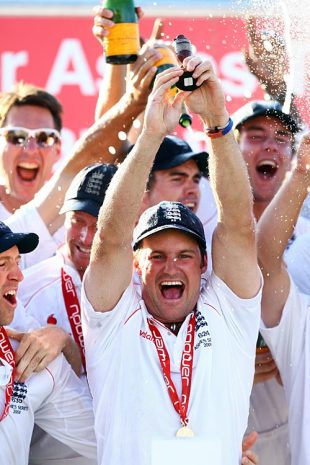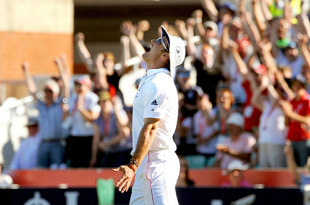
| ||
He took over with England in turmoil, but in eight months has forged a team that has regained the Ashes. For Andrew Strauss there can be no praise high enough
Listen to Strauss' press conference audio here
When the dust has settled on a tumultuous day at The Oval - and that could take some time, to judge by the sandstorms created by every delivery - one question will remain to vex the statisticians for as long as Test cricket survives. How is it possible that an Australian team boasting six of the seven leading run-scorers (not to mention all three of the leading wicket-takers) could possibly end up surrendering their most prized trophy?
The answer lies in the identity of the only Englishman to stamp his authority on either list. When Andrew Strauss pinged down the stumps from leg slip to remove Michael Clarke for a duck, he ensured, as a by-product, that his status as the summer's leading run-scorer could not be challenged. His tally of 474 runs at 52.66 was almost twice as many as England's next most prolific contributor, Matt Prior (261), but in the final analysis its worth was beyond calculation. Without Strauss's phlegmatic and unflinching solidity at the top, none of what transpired would ever have come to pass.
 England celebrate their 197-run win to beat Australia at The Oval and regain the Ashes
England celebrate their 197-run win to beat Australia at The Oval and regain the Ashes
The same could be said, in vastly contrasting circumstances, of Strauss's contribution to the triumph in 2005. Though derided as Shane Warne's "bunny", he still emerged as the only batsman on either side to manage more than one Test century, including - in the corresponding contest at The Oval - a first-day 129 of such understated confidence that it slips under the radar in terms of the most significant ever produced by an England batsman. Nobody in the current side, not even Andrew Flintoff, is more deserving of this hour of glory.
"For me, I suppose it is better than 2005, because I've captained the side," said Strauss. "But we've moved forward from then, there are different personalities involved, and a different management team as well. But any time you win an Ashes series it's an unbelievably special moment for all of us. It's just madness. You don't know what to do with yourself. You don't know whether to scream, cry, jump up and down, or lie on the ground.
"It's one of those situations that you can't prepare yourself for, and you don't let yourself think about that moment in case it never comes. We were all just running around like idiots, to be honest. That's as special a moment as you'll get on a cricket field - 2005 will live long in my memory, and these two moments are as special as anything I'll go through."
Flintoff will doubtless hog the limelight in the coming days, but Strauss will not care in the slightest, for it suits his methods to be underestimated - or at least, it does when he himself is certain that his own self-worth is intact. That was not the case 18 months ago, when he lost his place in the England side, ground down by a grim year in which he had been overlooked (in favour of Flintoff) for the England captaincy despite an impressive 3-0 victory over Pakistan, and then found out as an opener in the 2006-07 Ashes, when the late withdrawal of Marcus Trescothick left him feeling for his cover-drives in a bid to become the player he was not.
The following winter he was overlooked for the tour of Sri Lanka, and even when he returned for the subsequent tour of New Zealand - through the failures of others, most notably Ravi Bopara, rather than through any grand statement of renewed form - he scratched and chiselled for the first five innings of the series before rediscovering his joie de vivre with a gutsy, and ultimately series-winning 177, in the deciding Test in Napier. Beneath the public-school languor that gives an unexpected grace to his nuggetty batting style, there resides one seriously tough cookie.
And right now, he could hardly be more in command of his own performances. In 14 matches since the tour of India in December, he has racked up 1323 runs at 60.13 including six centuries - two in a single Test in Chennai, three in consecutive first-innings in the West Indies, and one, at Lord's in July, that ended a 75-year hoodoo and ensured that Australia spent the majority of a supposedly dominant series playing catch-up - a state of affairs that left them vulnerable to flashes of inspiration, not least the bowling performances of James Anderson at Edgbaston, and Stuart Broad on Friday.
"It seems such a long way off," said Strauss of his dark days in 2007. "I was struggling with my game and I was in a pretty negative mindset, worrying about my place in the side and all that sort of stuff. But I came back and was determined to enjoy every Test that I played, and that was a catalyst to turn my form around. I suppose the captaincy has helped my batting as well, but as we've demonstrated, six or seven months can be a long time.

| ||
| | ||
"We went through so many emotions today," he added. "Hope, frustration, worry... despair at times when we didn't look like taking a wicket. You don't realise how hard it is to get over the line until you do actually get over that line." None of this, however, was ever apparent to judge by the demeanour of a man who learnt his body language from the inscrutable Michael Vaughan, and who had a direct role in two of the three most salient moments of the day - the run-out of Clarke, and the game-breaking catch of Brad Haddin at cow corner.
Transmitting an air of calm has been Strauss's single biggest achievement as England captain. The influence of Andy Flower is an undeniable factor - Flower's Test record demands instant respect, as does the sagacity with which he imparts his wisdom to a team of impatient young athletes - but in terms of on-field influence, nobody can begin to question the example set by their captain.
Who else could have risen above the wreckage of that two-and-a-half day defeat at Headingley, other than a man who took the poisoned chalice of the England captaincy at a time, straight after the KP-Moores debacle, when the hemlock had seeped into every inter-personal relationship in the dressing room, and whose personal reaction to being bowled out for 51 in his first official Test in charge was to reel off three consecutive scores of 142-plus, to ensure that such an indignity could not happen again?
Strauss was England's constant, and the summer's constant as well. When England dominated, at Lord's, Edgbaston and The Oval, so too did he, with a century and three fifties (only the last of which came in the second innings) to lay the very platforms in those games that Australia's own first-innings lacked. Only once did he arrive at the crease with his mind and methods scrambled, on that tumultuous first morning at Headingley, when he spent the final 10 minutes before the toss trying to ascertain the fitness of his wicketkeeper, Matt Prior, and paid the price for his unfocussed preparation. Without his steadying influence, his team-mates simply capsized.
"It feels pretty special to be standing here right now," he said. "It feels like a lot more than seven or eight months ago when I took over. There's been a lot of water under the bridge, because we were in a pretty bad state, to be honest with you. But it's an amazing day, and one that seemed a long way off after Headingley. But all credit to the guys, because they had to dig deep. An Ashes series forces a player to dig deep, and the guys have done that and come out fighting. It's a special moment for all of us."
No comments:
Post a Comment